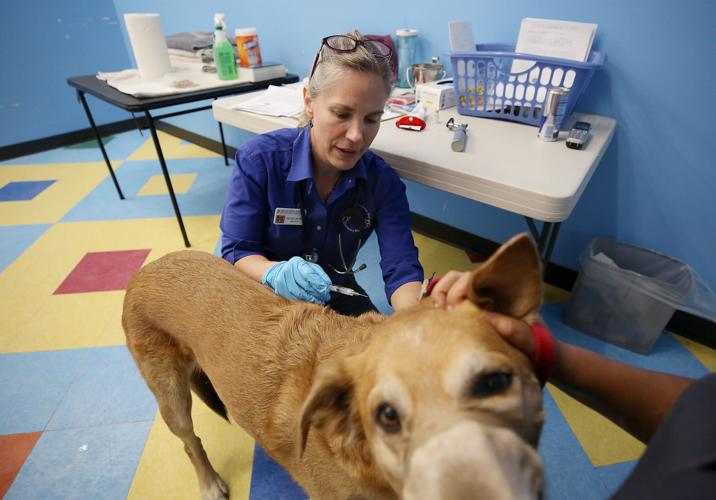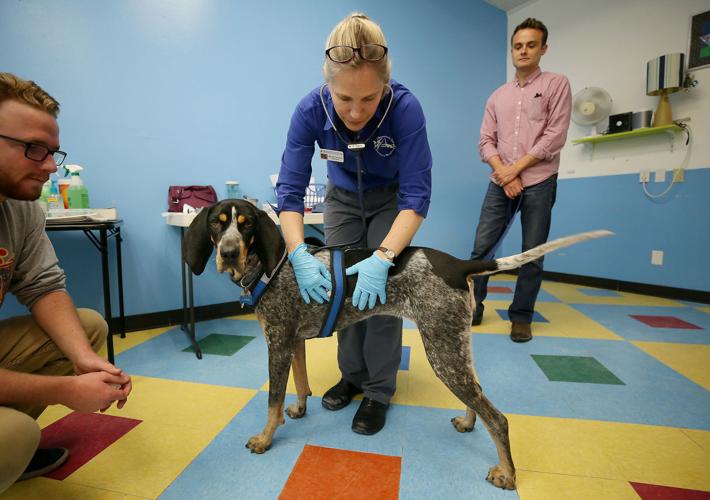At least seven ûÜÒøøÝýË-area dogs may have been sickened by a potentially deadly bacterial infection that can spread to humans.
On Thursday, the ûÜÒøøÝýË Department of Agriculture confirmed four cases of the contagious disease leptospirosis in Pima County dogs, all from the last month. But reports from veterinarians and owners of dog-related businesses in ûÜÒøøÝýË indicate there are more cases than the official report, with seven local dogs known to be potentially affected.
No human cases have been reported here, say officials with the Pima Animal Care Center and the Pima County Health Department.
The disease can be treated with antibiotics if itãs caught early enough. However, in more advanced cases, dogs go into kidney or liver failure and may require other types of care, costing thousands of dollars.
The Sit! Stay! Play! dog day care in midtown chose to temporarily close last week after one of its dogs tested positive for leptospirosis and another dog began showing symptoms, owner Janet Galante said. As of Friday she suspected four dogs from her facility got sick from the disease.
People are also reading…
The business held an impromptu vaccination clinic for clients Wednesday and some of the exposed dogs are taking prophylactic antibiotics under the supervision of their veterinarian, Galante said.
In Maricopa County, 65 dogs have been sickened with the previously rare leptospirosis since February 2016, said Craig Levy, an epizoologist with the Maricopa County Department of Public Health.
Because of what he terms a ãsteady increaseã in the number of dogs diagnosed with leptospirosis throughout ûÜÒøøÝýË, state veterinarian Dr. Peter Mundschenk is recommending dog owners consider vaccinating their dogs.
Mundschenk also recommends that dog boarding and day care facilities consider requiring proof of a leptospirosis vaccination prior to accepting dogs.
No cases have been reported at the county-operated Pima Animal Care Center but the dogs there are being closely monitored for symptoms, said Dr. Jennifer Wilcox, director of veterinary services at the shelter. County officials say they could find no laboratory-confirmed occurrences of leptospirosis in the shelter dating back to 2000.
Wilcox is recommending all clinicians practicing in the Pima County area consider leptospirosis in their diagnoses during the evaluation of ill animals.
The incubation period of the disease can vary quite a bit ã from four to 21 days.
Leptospirosis at Sit! Stay! Play! is unprecedented and an emotional issue. In the 15 years since sheãs opened, Galante has never before halted operations due to any illnesses in her client dogs. Sit! Stay! Play! is scheduled to reopen for vaccinated dogs on Monday.
So far, the sick dogs from Galanteãs day care have survived, though one nearly lost her life and was hospitalized for a week. That dog, a 5-year-old Siberian Husky named Sobaka, was scheduled to go home from a local animal hospital Friday. Still, the long-term effects from the leptospirosis remain unknown, her owner John Peterson said. He anticipated a veterinarian bill of about $5,000 or more.
Vaccine
A vaccine against leptospirosis is not included in the regular recommended ãcoreã vaccines that dogs get at their annual checkups. Dog owners must specifically ask for the vaccine if they want it.
The bacteria that causes leptospirosis is spread in the urine of infected animals, including rodents, wildlife, pets and livestock. The ûÜÒøøÝýË State Veterinarianãs Office says signs of leptisporosis in dogs include drinking and urinating more than usual, redness in the eyes, depression, a reluctance to eat and sometimes a fever.
The Southern ûÜÒøøÝýË Veterinary Medical Association sent out a letter last week for its members to be on the lookout for leptospirosis, confirmed Dr. Kay Dennis of the Monument East Veterinary Hospital.
Since the early symptoms of leptospirosis are vague, it could be easily missed ã particularly if veterinarians are not looking for it. The first dog to test positive from Sit! Stay! Play! had a delayed diagnosis of nearly a week despite visiting a veterinarian.
ãItãs not really on our radar here,ã Dennis said of the disease. ãWe have the wrong climate for it.ã
Sobakaãs diagnosis came two days after Peterson first noticed she wasnãt feeling well and he took her to the vet.
ãHer vets were not thinking leptospirosis,ã Peterson said.
Peterson, an aerospace engineer, has been sharing Sobakaãs story on Facebook and with his work colleagues over the past week and says he knows of at least three dogs that have recently been vaccinated as a result.
Gina Ragonese panicked last weekend when her 10-year-old pug-poodle named Ella, who attends Sit! Stay! Play!, had an upset stomach. Suspecting leptospirosis, she immediately took Ella to the veterinarian, who conducted whatãs known as a SNAP screening test for leptospirosis and the result was negative. Ella has remained healthy and on Wednesday was vaccinated.
Dennis was one of three volunteer veterinarians who gave leptospirosis vaccines to dogs at Galanteãs business for five hours on Wednesday. Dog owners paid $25 per vaccine and their pets will need a booster for another $25 within the next four weeks. Prices of the vaccines vary by individual veterinary clinics and an exam is needed to make sure dogs are healthy enough to get vaccinated.
Longtime Sit! Stay! Play! client Janet Klipp had all four of her dogs vaccinated for leptospirosis, even though they donãt all attend the day care. ãIãm a better-safe-than-sorry person,ã she said as she held her Maltese mix Lexi for her exam with Dennis.
Klipp said she is grateful that Galante was so proactive and transparent.
Galante is now requiring a leptospirosis vaccine for all dogs that use her facility.
Rare in ûÜÒøøÝýË
Leptospirosis is historically rare in Southern ûÜÒøøÝýË because sunlight and dry weather kill the bacteria, said Dr. Polina Vishkautsan, an internal medicine specialist at the north-side Veterinary Specialty Center of ûÜÒøøÝýË. Itãs more typically found in areas with more water and humidity, such as the U.S. South and Northeast.
In dry areas, the disease is often spread through a water source, she said, citing as an example a 2015 outbreak in dogs in Fresno, California that was traced to a dog park.
Like other local experts, Vishkautsan recommends dog owners in Pima County have individual discussions with their vet about vaccinating, particularly if their dog goes hunting, frequents communal areas, or has contact with wildlife or cattle.
An older version of the canine leptospirosis vaccine was associated with adverse allergic reactions. But the newer vaccines are considered safer for dogs, she stressed.
ãNow we donãt see more vaccine reactions from leptospirosis than from any other vaccine,ã Vishkautsan said. ãI pretty much think that the vast majority of dogs should be considered for vaccination.ã
Still, the risk for disease in ûÜÒøøÝýË remains very low, she said. ûÜÒøøÝýË of the sick dogs should be a reason for awareness, not panic, she added.
ãMost of the dogs do recover. If diagnosed and treated with antibiotics ã and most require stabilization with IV fluids ã the vast majority of them survive.ã
In rare cases, dogs will need dialysis, which is not available locally but is available in California. Itãs expensive, but the survival rate is between 80 and 90 percent, Vishkautsan said.
Human effect
In humans, leptospirosis can cause a wide range of symptoms, including some which may be mistaken for other diseases, says the Centers for Disease Control. Some infected persons may have no symptoms at all.
Without treatment, leptospirosis in humans can lead to kidney damage, meningitis ã inflammation of the membrane around the brain and spinal cord ã liver failure, respiratory distress, and even death.
However, in Maricopa County, one study of 100 staff members at veterinary clinics found no humans had contracted the disease, suggesting humans are at low risk at least to the strain that was circulating there.
In the U.S., humans at highest risk for the disease include workers at farms, mines, sewers, slaughterhouses and dairies, and veterinarians. Pima County officials say they checked records back to 2000 and found no human cases here.
ãItãs not usually people in Western countries getting it from their dog,ã Vishkautsan said. ãBecause itãs such a serious disease in people we want to be vigilant, but we do not want to instill panic. We just want awareness. The bacteria does not stay in the environment very long.ã
Leptospirosis can affect a wide variety of animals, but Vishkautsan said sheãs not aware of the disease in other domestic pets. ãThere is new information that cats can be carriers, but they usually do not get clinically ill,ã she said.
ûÜÒøøÝýË spike unexpected
Levy says the 65 dogs sickened in Maricopa County likely represent a fraction of the dogs that contracted leptospirosis. Thatãs because some dogs get infected but either have mild or no symptoms, yet can still be ãcarrier shedders,ã shedding the bacteria in their urine.
Officials donãt know exactly how the increase in ûÜÒøøÝýË occurred, but now that itãs here, the higher number of cases could continue.
ãWe have travelers coming in and out of ûÜÒøøÝýË, with folks using dog day cares and boarding,ã Levy said. ãThey intermingle, urinate and sniff ã that is what dogs do.ã
Contact health reporter Stephanie Innes at 573-4134 or email sinnes@tucson.com. On Twitter:
@stephanieinnes
















